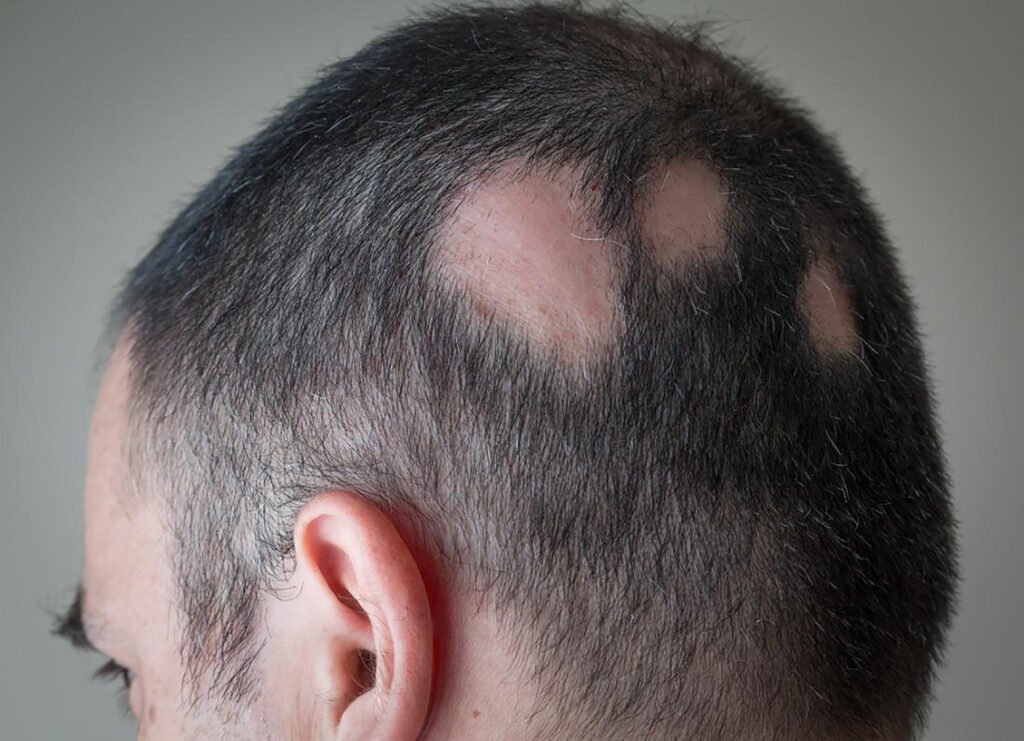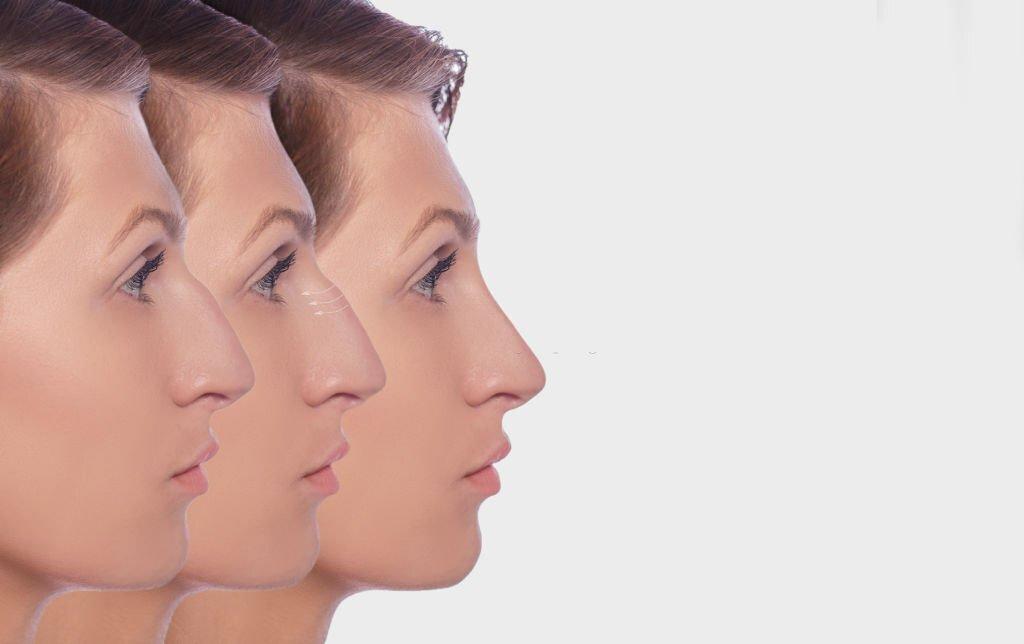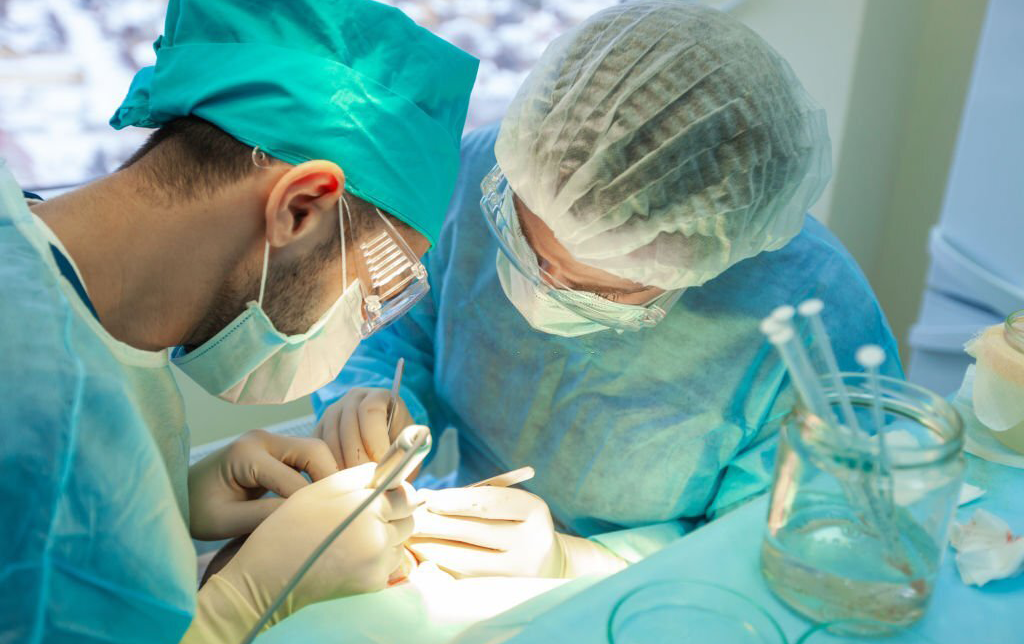Blogs

Understanding Alopecia Areata: Causes, Diagnosis, Treatment, and Impact
What is Alopecia Areata?
Alopecia Areata (AA) is a common, non-scarring type of hair loss that affects approximately 1.7% of the global population. Characterized by sudden, patchy hair loss, it can impact any hair-bearing area of the body and presents as one or more round or oval patches where hair has been completely lost. The condition can affect individuals of any age, but it is particularly prevalent among children, with around 20% of cases occurring before the age of 20. In more severe forms, Alopecia Areata may progress to Alopecia Totalis (complete scalp hair loss) or Alopecia Universalis (complete body hair loss).
Causes of Alopecia Areata
The precise cause of Alopecia Areata remains elusive, but it is believed to result from a combination of genetic and environmental factors. Potential triggers and contributing conditions include:
– Stress: It may act as a trigger for the onset of Alopecia Areata.
– Infections: Agents like Cytomegalovirus have been linked to the condition.
– Vaccinations: Though rare, they have been speculated as a potential cause.
– Hormonal Factors: Hormonal imbalances could contribute to its development.
– Genetics: Several genes (e.g., CTLA4, ULBP3/6, IL2/21, and IL2RA) have been associated with Alopecia Areata.
– Autoimmunity: The condition is thought to be an organ-specific autoimmune disorder, where T cells attack the hair follicles.
Differential Diagnosis
To accurately diagnose Alopecia Areata, it must be differentiated from other hair loss conditions such as:
– Androgenic Alopecia: Age-related hair loss often linked with hormonal changes.
– Telogen Effluvium: Temporary hair loss triggered by stress, illness, or hormonal changes.
– Trichotillomania: A psychological disorder characterized by compulsive hair pulling.
– Syphilitic Alopecia: Hair loss associated with syphilis, which can resemble Alopecia Areata.
Clinical Features
Alopecia Areata typically manifests as:
– Patchy Hair Loss: Oval or round patches of completely bald, smooth skin on the scalp or other hair-bearing areas.
– Coloration: A mild peachy or pinkish-red appearance of affected patches.
– Nail Dystrophy: Changes in the texture and appearance of nails may accompany the condition.
Diagnostic Laboratory Tests
To support the diagnosis and rule out underlying conditions, the following tests may be conducted:
– Thyroid Function Test: To check for thyroid disorders associated with Alopecia Areata.
– Nutrient Levels: Tests for ferritin, Vitamin D, B12, Selenium, Zinc, and Copper to address potential deficiencies contributing to hair loss.
Treatment Options
- Corticosteroids:
– Intralesional Corticosteroids: For adult patients with less than 50% scalp involvement, triamcinolone acetonide is commonly used. Initial hair regrowth is often seen within 4 to 8 weeks, with treatments repeated every 4 to 6 weeks. Side effects may include scalp atrophy.
– Topical Corticosteroids: Products like 0.05% betamethasone dipropionate or 0.2% fluocinolone acetonide can promote hair growth. Potential complications include skin atrophy and telangiectasia.
- Oral Corticosteroids:
– Prednisone, administered at 0.8 mg/kg in a tapering regimen over 6 weeks, may be effective for extensive cases. Side effects include weight gain, osteoporosis, and hypertension.
- Topical Sensitizers:
– Diphencyprone (DPCP): Applied as a 2% solution, it may take up to two years to see results. Side effects include vesicular reactions and altered skin pigmentation.
- Minoxidil:
– Topical minoxidil (2% solution) can induce hair regrowth by stimulating hair follicles and prolonging the anagen phase. It may cause scalp irritation and unwanted facial hair growth.
- Light Therapy:
– PUVA Therapy: Combines psoralen and UVA light to stimulate hair regrowth. Long-term use can increase skin cancer risk.
- Anthralin:
– Originally for psoriasis, it reduces inflammation around hair follicles and can be used in Alopecia Areata. It can cause skin irritation and staining.
- Biologics:
– Currently, biologic agents are not recommended due to limited evidence of their efficacy in Alopecia Areata.
- Combination Therapy:
– Combining topical steroids with minoxidil has shown promising results in enhancing hair regrowth.
Complications of Treatment
While treatments can be effective, they also have potential side effects:
– Corticosteroids: Local side effects include skin atrophy and telangiectasia, while systemic effects of oral steroids can include weight gain and hypertension.
– DPCP: Can cause allergic reactions and altered skin pigmentation.
– Minoxidil: May lead to scalp irritation and unwanted hair growth.
– PUVA: Risks include nausea and increased skin cancer risk.
Psychological Impact
Alopecia Areata can significantly affect self-esteem and emotional well-being, leading to anxiety, depression, and social withdrawal. Supportive care and counseling are crucial to help individuals cope with the psychological aspects of hair loss.
Prognosis
The prognosis varies; some patients experience spontaneous regrowth within a year, while others may have recurrent episodes. The severity of hair loss and response to treatment play a role in determining long-term outcomes.
Alopecia Areata presents a complex challenge with a range of treatment options and potential outcomes. At Saundarya City, we are dedicated to offering comprehensive care and support to individuals affected by Alopecia Areata. Whether you’re seeking diagnosis, treatment, or support, our team is here to help you navigate your journey to hair restoration and well-being.
Popular Posts

Nose Surgery (Rhinoplasty)
Nose reshaping (rhinoplasty or a "nose job") is an operation to change the shape or size of the nose...

Best Hair Transplant Doctor In Nagpur Location
Saundarya City Uses Modern techniques have enabled advanced methods for surgical hair transplants that can help restore lost hair...



 Book an Appointment
Book an Appointment